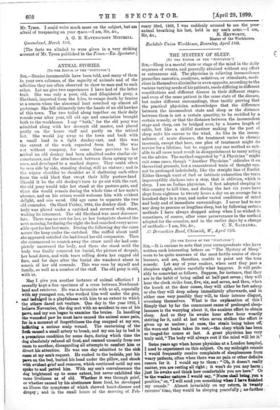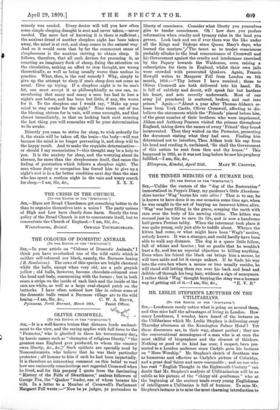[TO THE EDITOR OF THE "SPECTATOR.") SIR, —It is curious to
note that your correspondents who have written such interesting letters on "The Mystery of Sleep'" seem to be quite unaware of the most fertile source of sleep- lessness, and are, therefore, unable to point out the true remedy. Let any of your readers, when next they pass a , sleepless night, notice carefully what happens. It will prob- ably be somewhat as follows. Suppose, for instance, that they are in the habit of being called at half-past seven • they will. . hear the clock strike four, five, six, and seven, and then, when the knock at the door comes, they will either be fait asleep or else they will drop asleep immediately afterwards, and in either case very possibly they will, to their intense disgust, oversleep themselves. What is the, explanation of this Simply that by far the commonest cause of prolonged sleep- lessness is the worrying about it, the anxious effort to obtain sleep. And so they lie awake hour after hour wearily striving for it, until at last when seven strikes the effort- is given up as useless ; at once, the strain being taken off; the worn-out brain takes its rest,—the sleep which has been so longed-for comes at last. A great physician has very • truly said," The body will always rest if the mind will let it."
Some years ago when house physician at a London hospital, I used to experiment on this subject. On my midnight rounds I would frequently receive complaints of sleeplessness from weary patients, often when there was no pain or other definite. reason for it. I would say to them: "Oh, it doesn't really matter, you are resting all right ; it won't do you any harm ; just lie awake and think how comfortable you are here.* Or to the weaker natures I would say, "Nun, shall brims. you a poultice," or, "'will send you something when-I lava iniahed - thy rounds."' Almost invariably on my return, in "twenty _ minutes' time, they would be sleeping peacefully; ne-further: remedy was needed. Every doctor will tell you how often some simple sleeping draught is sent and never taken,—never needed. The mere fact of knowing it is there is sufficient ; the anxious dread of another sleepless night has been taken away, the mind is at rest, and sleep comes in the natural way. And so it would seem that by far the commonest cause of sleeplessness is the anxious striving to obtain sleep. It follows, therefore, that all such devices for procuring it, as counting an imaginary flock of sheep, fixing the attention on the circulation, making an effort to stop thought, are wrong theoretically, as well as being usually worse than useless in practice. What, then, is the real remedy ? Why, simply to give up the attempt to sleep if one's sleep does not come as usual. Give up trying. If a sleepless night is to be one's lot, one must accept it as philosophically as one can, re- membering that many and many a man has had to lose a night's rest before, and has been but little, if any, the worse for it. To the sleepless one I would say, "Make up your mind to stay awake for the night." Nine times out of ten the blessing, striven for in vain, will come unsought, and that almost immediately, so that on looking back next morning the last thing you will remember will be your determination to lie awake.
Directly you cease to strive for sleep, to wish ardently for it, the strain will be taken off, the brain—the body—will rest because the mind is no longer preventing it, and sleep will be the happy result. And to make the requisite determination— or should I say renunciation 1—this thought may be a help to you. It is the anxiety for sleep, and the worrying about its absence, far more than the sleeplessness itself, that cause the feeling of prostration which follows a sleepless night. The man whose duty or occupation has forced him to give up a night's rest is in a far better condition next day than the man who has spent a restless night in the vain and weary search























































 Previous page
Previous page